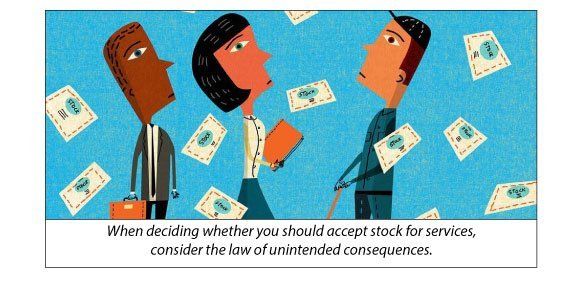Are you an attorney taking stock in client companies? If so, pay attention.
A few days ago as I was considering the topic for this week’s blog, one particular story caught my attention. “Microcap Financier Charged in $300M Securities Fraud,” was the headline of an article written by Bill Meagher at TheStreet. It covered news that Darren Ofsink, a corporate attorney in New York, was charged with conspiracy to commit fraud in connection with a public company called CodeSmart.
As a matter of being honest and transparent, the story caught my attention in large part because of my friendship and respect for Darren, who I’ve known for years and who in my own interactions has never offered me anything but the most conservative business and legal advice. As I dug into the allegations and read the formal complaint, the case took on more than a personal interest and I wanted to make sure that people employed in the business of raising capital understand the far-reaching ramifications of a case like this. If you’re a deal attorney, you should pay particularly close attention to what happens here.
In the case, the Department of Justice and the SEC allege that the parties involved – which include registered broker-dealers along with some unregistered deal promoters and service providers – committed a “pump and dump.” The $300 million in the headlines seems to be roughly based on the top-tick market value of the two microcap companies involved, CodeSmart and Cubed – pretty disconnected from the amount of money that was made and lost, legally or not.
The original complaint on this matter was filed in July 2014, and amended a couple of weeks ago to include Ofsink, along with brokers Michael Morris and Darren Goodrich. According to the complaint, Ofsink received his securities in question as compensation for services he performed in connection with his legal work. That’s the part of this case that I’m most interested in.
Most of what’s in the complaint as it relates to Ofsink struck me as fairly routine deal work. I’m not a paid reporter so I didn’t dig through all of the details but I was left pondering this question: Would my friend Darren be in the situation he’s in if he simply took cash payment instead of stock?
Attorneys are not typically tagged with the misdeeds of their clients. Lawyers are bound to “zealously represent the interests of their client.” In this case Darren seems removed from much of the ugly allegations of market manipulations. However, by taking stock as compensation he aligned his economic interests with his clients and opened the door to be considered a principal actor where the actions of his clients became his own.
I’ve worked with many attorneys and I can tell you that a lot of them accept stock or stock options as compensation. This includes both public and private companies. As one might expect, smaller companies are sensitive to cash expenditures and so arrangements involving equity in lieu of cash are quite common. If I were an attorney I would be paying close attention to this case as it relates to Ofsink in his capacity as an attorney and I wouldn’t be surprised if this case has a chilling effect on attorneys taking stock as compensation.
I’m not a lawyer but one law I know well is the law of unintended consequences. By bringing this case against Ofsink, one foreseeable result is that attorneys and other service providers stop accepting equity in exchange for their services. This would mean that companies raising capital would have far fewer options to get good advice and very likely those companies wouldn’t be as successful getting deals done. Obviously, this would be terrible for small company capital formation in general, which has been a big recent emphasis for Congress.
Something to think about.









